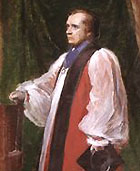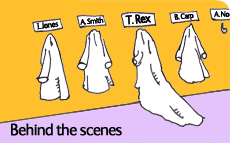Samuel Wilberforce
Samuel Wilberforce was a very religious man who became the Bishop of Oxford. So why is his name inextricably linked with Charles Darwin’s?

Samuel Wilberforce (1805-1873), © National Portrait Gallery, London
Samuel Wilberforce was a highly successful Victorian clergyman and one of the greatest public speakers of his day. Although derided by his critics as ‘Soapy’, he rose through the ranks to become Bishop of Oxford. Wilberforce is best remembered for his legendary encounter with Thomas Huxley. The two men publicly argued the case for and against Darwin’s controversial theory of evolution by natural selection. Their meeting is now acclaimed as a landmark in the history of science.
Work
A religious upbringing
Born in London in 1805, Samuel Wilberforce was the third son of William Wilberforce, the famous politician and anti-slavery campaigner. Both his parents were religious and prioritised their son’s spiritual and moral welfare. Rather than send him to school, they had him privately educated by a series of clerical teachers.
In 1823, Wilberforce enrolled at Oxford University. Although he and his college friends were unusually scholarly and religious, Wilberforce also enjoyed more light-hearted pursuits such as hurdle jumping and athletics.
Wilberforce graduated in 1826 and two years later was ordained as an Anglican priest.
The success of ‘soapy Sam’
Wilberforce’s first job was as curate for an Oxfordshire parish. Here, and in subsequent posts, he distinguished himself as an enthusiastic and capable clergyman. He actively promoted the Church, introducing extra services and founding Sunday schools.
A prolific writer, Wilberforce published collections of hymns, sermons and short stories – always with a moral message. Wilberforce was also an energetic writer of letters. His son later estimated that he completed an average of 6,430 a year, and on one occasion simultaneously dictated four letters to secretaries while writing a fifth himself.
Wilberforce was even more accomplished as a public speaker. With his charm, magnetic personality and great oratorical powers, he became one of the leading speakers of his day.
Wilberforce lived during a period of turmoil within the Anglican Church. An important issue regarded the conflicting influences of Protestantism and Roman Catholicism on Christianity in England. Wilberforce steered a careful course between the two opposing camps. His legendary slipperiness in arguments inspired his critics to nickname him ‘soapy Sam.’
But despite his reputation for soapiness, Wilberforce’s talents gained him support. In 1845 he was appointed Bishop of Oxford. It was as bishop that Wilberforce had his celebrated encounter with Thomas Huxley.
A legendary exchange
In 1859 Charles Darwin published The Origin of Species. In it, he proposed a mechanism for evolution – the theory of natural selection. The Church was outraged. Darwin’s book implied that humans were not created by God, but had evolved from other animals.
The book spawned a major dispute. On 30 June 1860, a key event took place at a scientific conference in Oxford. Bishop Samuel Wilberforce was to speak against Darwin’s views. Thomas Huxley, who has since been called ‘Darwin’s bulldog’, was present as his defence. Darwin himself was too sick to attend.
Although opposed to Darwin, Wilberforce had a keen interest in natural history and was fairly knowledgeable on the subject. While preparing his speech he sought advice from Richard Owen, an eminent scientist who was very religious and also rejected evolution.
On the day, the room was packed with more than 700 people. Everyone expected a lively debate, but none realised quite how dramatic it would be.
Wilberforce took the podium first. Having eloquently presented his case he attempted to undermine Darwin’s supporters with a provocative question: was Thomas Huxley descended from an ape on his grandfather’s or grandmother’s side of the family? Huxley, another formidable public speaker, responded sharply that he was not ashamed of his ancestry, but that ‘he would be ashamed to be connected with a man who used great gifts to obscure the truth’.
Huxley’s suggestion that he would rather have an ape for an ancestor than a bishop caused an uproar. One lady fainted while Robert FitzRoy, Darwin’s captain on his voyage aboard the Beagle, brandished a Bible and implored the audience to have faith in God.
It is often reported that Huxley ‘won’ the fight, although in truth neither man was victor. But the debate itself was a step forward for the Darwinists. Just a few years earlier, anyone who publicly supported scientific views at odds with accepted religious doctrine risked being ostracised. For this reason, the historic encounter between Wilberforce and Huxley marks a turning point in the history of science.
‘… man’s power of articulate speech; man’s gift of reason; man’s free will and responsibility… all are equally and utterly irreconcilable with the degrading notion of the brute origin’On Darwin’s The Origin of Species
‘The principle of natural selection is absolutely incompatible with the word of God’
‘no one doubted [Huxley’s] meaning, and the effect was tremendous. One lady fainted and had to be carried out; I, for one, jumped out of my seat.’ – Isabel Sidgwick, who was present at the meeting.
Timeline
| 1805 | Born 7 September, London, England |
|---|---|
| 1823 | Enters Oriel College, University of Oxford |
| 1826 | Graduates from Oxford |
| 1828 | Ordained by the Church and appointed curate-in-charge at Checkenden, near Henley-on-Thames |
| 1830 | Appointed pastor of Brighstone, Isle of Wight |
| 1833 | Publication of Notebook of a Country Clergyman |
| 1833 | Slavery is abolished in the British Empire |
| 1837 | Victoria becomes Queen |
| 1838 | Publication on Life of William Wilberforce, written with his brother Robert |
| 1839 | Appointed Archdeacon of Surrey |
| 1839 | Publication of Agathos , a collection of short stories |
| 1840 | Appointed pastor of Alverstoke, Hampshire |
| 1840 | Publication of The Rocky Island, a collection of short stories |
| 1841 | Appointed chaplain to Prince Albert |
| 1844 | Appointed sub-almoner to Queen Victoria (an official distributor of alms to the poor) |
| 1844 | Publication of The History of the Protestant Episcopal Church in America |
| 1845 | Appointed Dean of Westminster, then later the same year became the Bishop of Oxford |
| 1847-69 | Appointed high almoner to Queen Victoria |
| 1854 | Opened a theological college at Cuddesdon |
| 1859 | Publication of Charles Darwin's The Origin of Species |
| 1860 | The legendary encounter between Wilberforce and Huxley takes place on 30 June |
| 1860 | Published a lengthy review of Darwin's The Origin of Species in a journal, Quarterly Review. Darwin thought the piece ‘uncommonly clever.' |
| 1869 | Appointed Bishop of Winchester |
| 1873 | Died 19 July, near Leatherhead, Surrey, after a fall from his horse |
Toolbox

Our fossil insect collection includes Rhyniognatha hirsti, the world's oldest fossil insect, dating back some 400 million years.